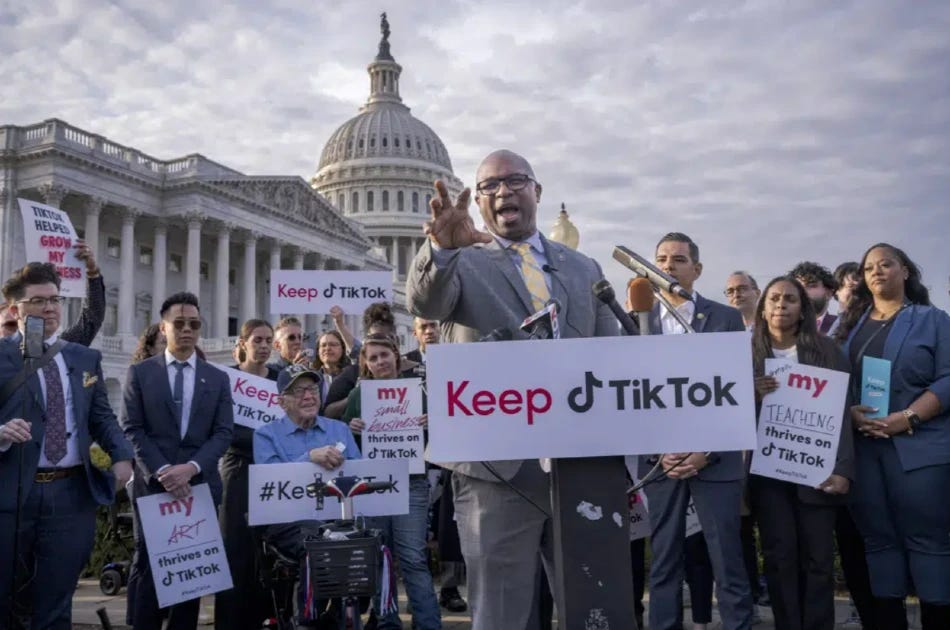Tik Tok has 37 days left in the US, Do you need cyber insurance?, One Hundred Years of Solitude now on TV.
Tik Tok, Time is Running Out.
Welcome! La Chapulina Verde is bilingual. Every article is available in English and Spanish. Enjoy reading in your preferred language. Keep up to date and follow us on our social networks! Instagram, Threads, Facebook, and YouTube.
❤️ Cosas que nos encantan | ❤️ Things We Love
La Chapulina Verde wants to gift you this Christmas. Get ready for a Christmas giveaway full of joy and flavor.
This week we are giving away 2 Amazon gift cards worth $100 each, perfect for giving a special touch to your celebrations.
How can you participate?
Share us! Simply click the green button below and send our newsletter to your friends, family, and and loved ones. And for more chances to win, follow us on social media. Click the green button. Good luck!
The giveaway ends on Thursday, December 19, 2024. We will announce the 2 winners next Friday, December 20, 2024 in the newsletter.
Don't miss this opportunity to give a special touch to your Noche Buena, Secret Santa or Christmas shopping.
Good luck, family!
La Chapulina
TikTok’s Future in the U.S. Balancing Security, Speech, and Economics
The fate of TikTok in the United States has become a flashpoint for debates over national security, free speech, and economic impacts. A federal court has ordered its parent company, ByteDance, to sell the app by January 19, 2025, or face a nationwide ban. This decision affects 170 million American users and numerous businesses dependent on the platform.
Image source: The Associated Press
National Security Concerns
The U.S. government’s actions stem from fears about TikTok’s ties to China. Critics argue ByteDance could be forced to share user data or manipulate content at China’s direction, though ByteDance denies these claims. Lawmakers assert the divestment order is necessary to mitigate national security risks. However, experts warn that banning TikTok might not solve the broader issue of widespread data collection and availability, which remains a vulnerability across platforms. Some believe a ban could push users toward less secure alternatives, heightening risks.
Economic Consequences
A TikTok shutdown could deliver a heavy economic blow. The platform estimates a one-month ban would cost U.S. small businesses and creators $1.3 billion in revenue. With nearly 7 million American businesses leveraging TikTok, 69% report increased sales thanks to the app. For small businesses, TikTok offers affordable advertising and significant reach, contributing $8.5B to the U.S. GDP in 2023. Content creators face potential losses of $300M in just one month, threatening their livelihoods and the platform’s long-term viability. ByteDance highlights these risks in its legal filings, emphasizing the cascading effects on economic activity.
Free Speech and Precedent
The controversy also raises free speech concerns. ByteDance argues that forcing a sale violates users’ First Amendment rights to express themselves on the platform. While a federal court dismissed this claim, the issue remains contentious. Critics worry about the precedent set by such government intervention. If ownership ties justify targeting a platform, similar actions could follow against other companies, raising questions about balancing security with freedoms in a digital era.
Legal and Political Battles Ahead
The fight isn’t over. ByteDance plans to appeal to the Supreme Court and has requested a delay in enforcing the divestment order. The company argues the Court should have time to review the case and that the incoming administration might reassess the situation. The Department of Justice, however, has urged courts to reject these efforts, emphasizing the law’s bipartisan support and narrow focus on security risks.
As this legal battle unfolds, its resolution will impact not only TikTok but also broader discussions on regulating technology in the 21st century. The stakes are high, involving security, personal freedom, and billions in economic activity, making this a pivotal moment for digital governance.
Why Cyber Insurance is Essential for Your Business.
Don't wait for it to happen to you.
In an era where cyberattacks are increasingly common, no business is immune. While many companies have traditional insurance to cover physical damage or liability, few consider the digital risks that can cripple operations. Cyber liability insurance offers critical protection for businesses navigating today’s cyber threat landscape.
The Growing Threat of Cyberattacks
Hackers are no longer focused solely on large corporations. Small and mid-sized businesses are now prime targets, often due to weaker security measures. The financial toll of a data breach is staggering. In the U.S., the average cost exceeds $6.5 million, including nearly $700,000 in legal fees alone. Beyond direct costs, businesses must grapple with reputational damage, customer lawsuits, and public relations fallout. For smaller businesses, these expenses can lead to closure.
Any company handling sensitive customer information, such as names, payment details, or Social Security numbers, is responsible for safeguarding this data. A breach can erode customer trust and devastate finances. Cyber liability insurance mitigates these risks, offering a financial safety net during crises.
What Cyber Insurance Covers
Cyber insurance is designed to address the multifaceted consequences of a breach. Common areas of coverage include:
Data Protection: Assistance with recovering stolen or damaged data and compensating for revenue loss due to downtime.
Legal Support: Coverage for lawsuits or claims related to third-party impacts.
Digital Risks: Protection against issues such as copyright infringement or defamation tied to a company’s online presence.
Ransomware Payments: Financial aid to meet ransom demands, should hackers threaten to release sensitive information.
Regulatory Fines: Support for penalties incurred if a company is found negligent in protecting customer data.
Key Questions to Consider
Not all cyber insurance policies are created equal. Businesses should evaluate their needs by asking these questions:
Does the policy cover data stored with third-party vendors, such as cloud providers?
Are breaches caused by unencrypted or personal employee devices included?
Does it cover data restoration costs?
Will ransom demands be reimbursed?
Are fines from regulatory agencies included in the coverage?
Does it provide identity theft protection and credit monitoring for affected customers?
Preparing for the Inevitable
Cyberattacks are no longer a possibility—they’re a certainty. Without proper insurance, businesses face overwhelming costs that could derail their future. Beyond financial protection, cyber insurance helps rebuild customer trust, a crucial factor in retaining a loyal client base.
Taking proactive steps to secure a policy tailored to your company’s specific risks is an investment in long-term stability. Partnering with a knowledgeable insurance provider ensures that your business is prepared to face threats head-on.
In a digital-first world, cyber insurance isn’t a luxury—it’s a necessity. Don’t wait for a breach to expose vulnerabilities. Protect your business now and safeguard the hard work you’ve invested.
One Hundred Years of Solitude: From Page to Screen.
The literary master piece made into a mini series.
The arrival of One Hundred Years of Solitude, Gabriel García Márquez’s masterpiece, on Netflix marks a milestone in the history of literary adaptations. This ambitious series, which recreates the magical world of Macondo and the saga of the Buendía family, seeks to translate one of the 20th century's most iconic novels into the audiovisual medium. However, the project faced significant challenges, from honoring the essence of the book to meeting the expectations of millions of readers who have envisioned its characters and settings for decades.
During his lifetime, García Márquez was adamant about not selling the rights to One Hundred Years of Solitude. He often expressed concerns that any adaptation could interfere with how readers visualized the characters and the town of Macondo. However, after his passing in 2014, his sons, Rodrigo and Gonzalo García Barcha, decided to move forward with the idea, believing that a series—with its ability to explore the story in depth—could do justice to the novel.
Netflix acquired the rights in 2019, committing to a production that respected the cultural and literary identity of the work. This included the decision to base the entire project in Colombia, employing local talent both in front of and behind the camera. With an estimated budget of $50 million, the production built an entire town to recreate Macondo and conducted detailed research into 19th- and early 20th-century Colombian customs and traditions to faithfully depict the world described in the novel.
One of the creators' primary challenges was translating magical realism to the screen without losing its essence. The series opted for artisanal techniques to represent extraordinary events, such as the priest’s levitation or the rain of yellow flowers, avoiding an over-reliance on digital effects. Laura Mora, one of the series’ directors, explained that they wanted these scenes to stay true to the spirit of the book while maintaining a tangible connection to the reality it evokes.
Casting was another critical hurdle. The selection of actors aimed to balance seasoned talent with emerging stars in an effort to authentically bring the characters to life. Claudio Cataño portrays Colonel Aureliano Buendía, Marleyda Soto Ríos plays Úrsula Iguarán, and Diego Vásquez takes on the role of José Arcadio Buendía. According to Mora, the rigorous casting process and respect for the characters helped capture the soul of the Buendía family.
The series, which consists of eight episodes in its first season, has already generated reactions from critics and viewers. Rodrigo García, the author’s son and an executive producer of the series, stated that his father would have enjoyed this adaptation. Critics like Jack Seale from The Guardian praised the visuals and key moments, describing them as “surprisingly beautiful.”
Although it’s impossible to match every reader’s imagination, Netflix’s adaptation aims to honor One Hundred Years of Solitude. Rather than competing with the novel, the series seeks to complement the literary experience and bring the magic of Macondo to new generations.









